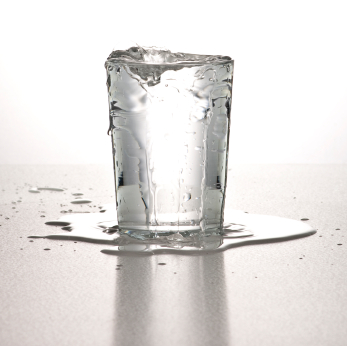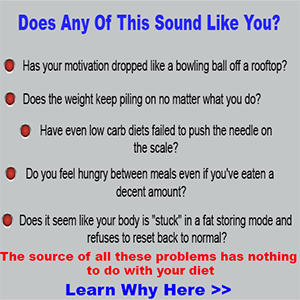Drinking Water Increases Fat Oxidation
I am sure you have heard or read the weight loss tip of drinking water to help you lose weight. Well, for most of us the reason for drinking water was to help feel fuller faster so we ate less calories.
Also, if we drank water instead of caloric beverages we would consume less calories, which may lead to weight loss. There were also the critics that may have told you this was ridiculous and you were wasting your time drinking water as a tool for greater weight loss.
Well, there is some pretty solid evidence that says this is not ridiculous at all and the studies conducted on this have been some of the more rigorous studies conducted with crossover experiments and randomized and controlled trials.
In various crossover experiments drinking water resulted in lower total caloric intake with the subjects that were tested. The reason for this is simple and it is because they were not consuming calorie filled beverages. They were replacing these caloric beverages with water that has zero calories.

What was also found was that the individuals do not eat less food when they know they are drinking caloric beverages. They still eat the same amount of calories regardless of if their beverages contained calories or not.
Drinking Water Increases Fat Oxidation
Fat oxidation is at its greatest when your insulin levels are low. The reason for this is because insulin inhibits or decreases the ability of rate limiting enzymes that breakdown triglyceride fats into free fatty acids. As well as the transport of these free fatty acids into the mitochondria and Krebs cycle to be burned for energy.
Since water does not contain calories or carbohydrates like over beverages it does not trigger an insulin response. If you were to compare it to the glycemic index water is of course 0, milk is around 35, juice is around 50 and sugary drinks are as high as 80.
Keeping your insulin levels lows results in greater rates of fat oxidation. Now remember this doesn't apply just to water. The foods you eat and what combination of nutrients you eat can all influence the insulin response. Keeping your insulin response consistently lower throughout the day will allow your body to burn more stored fat as energy.
Anytime your insulin and blood sugar levels are elevated you stop fat breakdown and fat oxidation.
There have been decades of crossover studies that consistently show higher levels of fat oxidation when drinking water compared to caloric drinks before or during low to moderate exercise. If you look at the average of these studies the fat oxidation is around 40% greater after water is consumed than after a caloric beverage.
It is normal for fat oxidation to be depressed for a length of time after a meal because naturally your body is going to release insulin to properly utilize the nutrients you just consumed. What you choose for your beverage though can dictate how long that slow down of fat oxidation really is.
Research has shown that drinking water instead of a caloric beverage can restore the rate of fat oxidation to pre-meal levels about 2 hours sooner than if you were to drink a caloric beverage with the same meal.
Some studies have shown that consumption of 500-600 calories from carbohydrates can depress fat oxidation for 6 hours after consumption.
Hypocaloric Diets and Water Leads To Weight Loss
Two very interesting intervention studies looked at a hypocaloric diet and then the same diet plus water as the beverage. One study looked at 48 randomized overweight or obese men and women. They were given a hypocaloric diet plus 500ml of water at each meal or they were just given the hypocaloric diet (control) with no water.
The results showed that weight loss in the water group was 2kg greater. In analysis of data from the Stanford A to Z Study they focused on 155 overweight premenopausal women who reported drinking less than 1L/ day of water before beginning 1 of 4 different weight programs. The programs were the Atkins diet, Zone diet, LEARN diet, and Ornish diet. The 4 programs do recommend drinking 1L/day of water or more and limiting or no intake at all of caloric beverages.
After 2 months of their diet classes they all reported higher water intake and less caloric beverage intake. Independent of any changes in diet or physical activity those who increased their water intake and decreased caloric beverage intake had significantly greater weight loss.
Water And Metabolic Syndrome
Surprising new research from the University of Colorado shows that drinking water alone may redue the incidence of Metabolic Syndrome, also know as MetS. This syndrome, which may precede Type 2 diabetes, is highlighted by high blood pressure, cholesterol, and weight carried around the belly.
The latest results, however, show that drinking water--and not fructose-sweetened beverages--may lose more fat by reducing levels of vasopressin. Vasopressin is a hormone released from your brain that increases water retention, which leads to dehydration by storing more water as 'metabolic water.' The researchers discovered that being dehydrated often leads to weight and body fat gain.
By drinking water, however, you may lower vasopressin levels, therefore you may be able to lose weight and stay hydrated at the same time. This also reduces the amount of 'metabolic water' stored in your fat, which could also lead to weight loss.
Summary
Ok, lets summarize all this data as some of it may have gotten confusing.
Drinking water during the day and at your meals instead of drinking calorie filled beverages decreases your total calorie intake and it also promotes greater fat oxidation, which is the burning of stored fat as energy.
So drink water at meals and in-between meals instead of calorie filled beverages. Finally, eat a higher protein rich and lower carb diet to minimize the insulin spikes that will depress fat oxidation for hours after that meal.
References:
Almiron-roig E, Drewnowski A. Hunger, thirst and energy intakes following consumption of caloric beverages. Physiol Behav. 2003;79:767-773.
Beridot-Therond ME, Arts I, Fantino M, DeLaGueronniere V. Short-term effects of the flavour of drinks on ingestive behaviours in man. Appetite. 1998;31:67-81.
Canty DJ, Chan MM. Effects of consumption of caloric vs noncaloric sweet drinks on indices of hunger and food consumption in normal adults. Am J Clin Nutr. 1991;53:1159-1164.
Cecil JE, Palmer CNA, Wrieden W, et al. Energy intakes of children after preloads: adjustment, not compensation. Am J Clin Nutr. 2005;82:302-308.
Della Valle DM, Roe LS, Rolls BJ. Does the consumption of caloric and non-caloric beverages with a meal affect energy intake? Appetite. 2005;44:187-193.
Flood JE, Roe LS, Rolls BJ. The effect of increased beverage portion size on energy intake at a meal. J Am Diet Assoc. 2006;106:1984-1990.
Hagg A, Jacobson T, Nordlund G, Rossner S. Effects of milk or water on lunch intake in preschool children. Appetite. 1998;31:83-92.
King NA, Appleton K, Rogers PJ, Blundell JE. Effects of sweetness and energy in drinks on food intake following exercise. Physiol Behav. 1999;66:375-379.
Paterson CR. Essentials of Human Biochemistry. Edinburgh: Churchill Livingstone; 1987.
Nutritional Biochemistry and Metabolism. New York: Elsevier; 1991.
Foster-Powell K, Holt SHA, Brand-Miller JC. International table of glycemic index and glycemic load values: 2002. Am J Clin Nutr. 2002;76:5-56.
Kirwan JP, O'Gorman DJ, Cyr-Campbell D, Campbell WW, Yarasheski KE, Evans WJ. Effects of a moderate glycemic meal on exercise duration and substrate utilization. Med Sci Sports Exerc. 2001;33:1517-1523.
Kirwan JP, O'Gorman D, Evans WJ. A moderate glycemic meal before endurance exercise can enhance performance. J Appl Physiol. 1998;84:53-59.
Wallis GA, Dawson R, Achten J, Webber J, Jeukendrup A. Metabolic response to carbohydrate ingestion during exercise in males and females. Am J Physiol Endocrinol Metab. 2006;290:E708-E715.
Stookey JD. Drinking water results in greater fat oxidation than beverages that contain carbohydrate during low to moderate intensity exercise. Poster presented at Experimental Biology, New Orleans, April 18-22, 2009.
Febbraio MA, Chiu A, Angus DJ, Arkinstall MJ, Hawley JA. Effects of carbohydrate ingestion before and during exercise on glucose kinetics and performance. J Appl Physiol. 2000;89:2220-2226.
Ostman EM, Elmstahl HGML, Bjorck IME. Inconsistency between glycemic and insulinemic responses to regular and fermented milk products. Am J Clin Nutr. 2001;74:96-100.
Montain SJ, Hopper MK, Coggan AR, Coyle E. Exercise metabolism at different time intervals after a meal. J Appl Physiol. 1991;70:882-888.
Dennis EA, Dengo AL, Comber DL, et al. Water consumption increases weight loss during a hypocaloric diet intervention in middle aged and older adults. Obesity. 2010;18:300-307.
Stookey JD, Constant F, Popkin BM, Gardner C. Drinking water is associated with weight loss in overweight dieting women independent of diet and activity. Obesity (Silver Spring, Md). 2008;16:2481-2488.
Nutrition Today "Drinking Water and Weight Management" November/December 2010 Volume 45 Number 6S
https://neurosciencenews.com/water-metabolic-syndrome-17444/
About Jayson Hunter & Jaylab Pro

Jaylab Pro was founded by Registered Dietitian Jayson Hunter. Jayson has been recognized as one of America's foremost weight loss experts by America's Premier Experts™. He has also been featured in USA Today for this accomplishment. Jayson is also a best-selling author having co-authored multiple books in health & fitness and business growth. Jayson and the Jaylab Pro team are proud to create content that helps improve the lives of millions of people around the world. We hope you enjoy it just as much as others have.
 If you order a JayLabPro SmartShip product or any Combo Package, we will automatically ship you a new supply of the product or products you have ordered every month, starting 30 days after your initial order is shipped, and continuing until you cancel. The credit card you are using today will be billed the lowest available price for those product or products when your order is shipped, but shipping will be FREE. You may log into your customer account or call our customer service department toll-free at 1-888-9GETPRO (1-888-943-8776) between the hours of 8am – 9pm EST Mon-Fri to cancel future shipments, customize the timing of your shipments, or change the credit card used for billing.
If you order a JayLabPro SmartShip product or any Combo Package, we will automatically ship you a new supply of the product or products you have ordered every month, starting 30 days after your initial order is shipped, and continuing until you cancel. The credit card you are using today will be billed the lowest available price for those product or products when your order is shipped, but shipping will be FREE. You may log into your customer account or call our customer service department toll-free at 1-888-9GETPRO (1-888-943-8776) between the hours of 8am – 9pm EST Mon-Fri to cancel future shipments, customize the timing of your shipments, or change the credit card used for billing.










